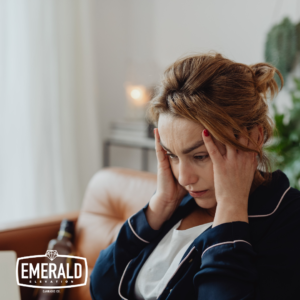Can CBD, CBG, and CBN Help You Sleep and Reduce Stress? A Natural Wellness Guide
Ever feel like life throws you curveballs? You’re not alone. Many people deal with anxiety, stress, and sleep problems. If you’ve been curious about CBD products but unsure where to begin, this is for you! Let’s explore three powerful natural compounds found in cannabis plants: CBD, CBG, and CBN. Each one offers unique benefits, and they might just become your new best friends for overall wellness.
 What is CBD?
What is CBD?
CBD, or cannabidiol, is a naturally occurring compound found in hemp, a close relative of marijuana. Unlike THC, the psychoactive ingredient in marijuana that gets you high, CBD won’t alter your mind. Research suggests CBD might be a natural remedy for a variety of issues, including:
- Anxiety and Stress: Studies show CBD may help by interacting with receptors in your brain that regulate mood and fear response.
- Chronic Pain: CBD might help manage chronic pain by reducing inflammation and interacting with pain receptors in your body. Think of it as a double whammy against pain!
- Everyday Aches and Pains: Similar to chronic pain, CBD may offer relief from everyday aches and pains by reducing inflammation and promoting relaxation. Soothe those sore muscles!
- Nausea: Dealing with nausea, especially from chemotherapy? Early research suggests CBD might be helpful in reducing nausea and vomiting.
- Skin Conditions: Struggling with eczema or psoriasis? While more studies are needed, some evidence suggests CBD may improve skin health by reducing inflammation and promoting healing.
The “Mother” with Big Potential: CBG (Cannabigerol)
Imagine CBG as the stem cell of cannabinoids. It’s the precursor molecule from which many other cannabinoids, including CBD and THC, are formed by the cannabis plant. While research on CBG is still emerging, it shows promise for a wide range of benefits:
- Inflammation and Pain: Similar to CBD, CBG might help manage inflammation and pain by interacting with your body’s endocannabinoid system, a network of receptors that influence various functions.
- Anxiety and Stress: Feeling on edge? Early studies suggest CBG may have mood-boosting properties and could potentially help reduce anxiety and stress.
- Glaucoma: This eye disease can be a real concern. Some research suggests CBG might help lower eye pressure, a major risk factor for glaucoma.
- Brain Protection: Protecting your brain is important! Emerging studies are exploring the potential neuroprotective properties of CBG, meaning it might help shield brain cells from damage.
 The Sleep-Inducing Champion: CBN (Cannabinol)
The Sleep-Inducing Champion: CBN (Cannabinol)
Think of CBN as your sleep buddy. It’s a byproduct that forms as THC naturally breaks down over time. Unlike THC, CBN has very low psychoactive effects, so it won’t get you high. Here’s where CBN shines:
- Sleep: CBN interacts with receptors that influence the immune system and sleep regulation. Studies suggest CBN might promote relaxation and improve sleep quality, making it a potential ally for restful nights.
- Pain Relief: CBN, like CBD and CBG, might also have pain-relieving properties by interacting with your body’s endocannabinoid system.
The Power of Three: Working Together is Better
Remember the phrase “teamwork makes the dream work”? It applies to these cannabinoids too! The entourage effect describes the synergy between cannabinoids and other compounds found in cannabis, like terpenes (the fragrant compounds that give cannabis its unique smell and flavor). Research suggests that when consumed together, these cannabinoids and terpenes may amplify each other’s effects, creating a more well-rounded and potentially more effective experience.
Important Must-Knows Before You Dive In
- Talk to your doctor first! Everyone’s body is different, and what works wonders for your friend might not have the same impact on you. It’s always a good idea to consult with your doctor to see if CBD, CBG, or CBN are a good fit for your individual needs and health conditions, especially if you have any existing conditions or taking medications.
- Source matters! With so many CBD, CBG, and CBN products on the market, it’s important to choose wisely. Look for reputable brands that prioritize quality control and have their products tested by independent labs to ensure purity and potency. You want to know exactly what you’re putting into your body.
Can CBD Cause Psychosis?
While CBD is generally well-tolerated, there is limited research on potential side effects. Some studies suggest that high doses of CBD, particularly in people predisposed to psychosis, might increase the risk of psychotic episodes. It’s important to talk to your doctor about any concerns you have regarding CBD use, especially if you have a history of mental health conditions.
Finding high-quality CBD, CBG, and CBN products can be tricky, but here are some tips to help you navigate the market:
- Look for reputable brands: Do your research! Read reviews, check out brand websites, and look for companies with a good reputation for quality and transparency. Consider local dispensaries located right here in Maine.
- Check for lab reports: Reputable brands will have their products tested by independent labs to ensure purity and potency. Look for reports that detail the cannabinoid profile (the amount of CBD, CBG, and CBN) and confirm the absence of contaminants.
- Consider the delivery method: CBD, CBG, and CBN come in various forms, including oils, tinctures, capsules, edibles, and topicals.
- Oils and tinctures are typically placed under the tongue and absorbed quickly.
- Capsules offer a convenient way to ingest a pre-measured dose.
- Edibles come in various forms like gummies or baked goods, but take longer to take effect.
- Topicals are applied directly to the skin for localized relief.
How Much CBD Should a Beginner Start With?
This is a great question, and it’s important to start low and slow with any new cannabinoid. There’s no one-size-fits-all answer, as the ideal starting dose depends on factors like your body weight, metabolism, and the specific condition you’re trying to address. However, most recommendations suggest a starting dose of 5 milligrams (mg) of CBD per day. You can then gradually increase the dose every few days until you find the amount that works best for you. It’s important to consult with your doctor before starting any new supplements or medications, including CBD, to determine a safe and appropriate starting dose for you
Remember: It’s important to consult with your doctor before starting any new supplement or medication, including CBD, CBG, and CBN. They can help you determine if these cannabinoids are safe and appropriate for you, considering any existing health conditions or medications you’re taking.
Not sure which cannabinoid might be right for you? Visit our website and learn more.

